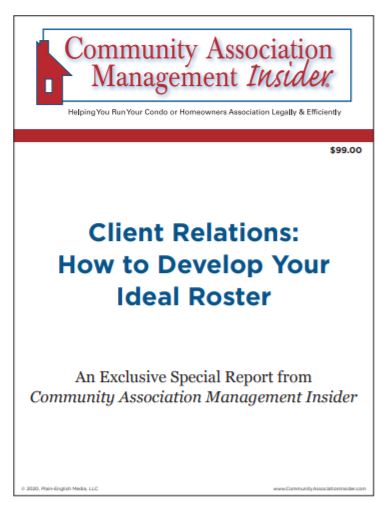Dealing with Boards
Client Relations: How to Develop Your Ideal Roster

Strong relationships with your community association clients are always important — but not always easy — to maintain. When times are tough economically, you can’t afford to lose clients, but even when finances are robust, an unhappy client or former client can cause trouble for your future prospects.
That doesn’t mean, though, that managers have to settle for rocky treatment from clients that are overly demanding, unappreciative, or even abusive. Concessions can be made for exceptionally trying times, of course, but wouldn’t you rather develop solid, productive, and mutually satisfying relationships with your clients?
This exclusive Special Report aims to help you do just that. It provides valuable guidance on how to identify and land the right clients, establish and enforce boundaries, manage poor conduct, and leverage happy clients.
Start creating the business and the client relationships you want and deserve today.
Download now »How to Keep the Board Full and Fresh
4 Tips for Recruiting New Board Members
Online Owner Payments, Part 1: Making The Case To The Board
What Do Members Really Think About Their HOAs?
Defining Board Officers’ Duties
While serving on the board of a community association is a volunteer position, board members can get very invested in it. It’s not uncommon to hear about board members who overstep boundaries. That’s why it’s important to be able to gently—or in some cases, more firmly—remind a member who’s taking over duties that aren’t part of her position about the board members’ official duties and why it’s important for everyone to play his or her role.
Help New Board Member Transition into Role
When a board member gives up her position, your association will have the sometimes difficult task of replacing the outgoing member. But the challenging part of replacing a member comes after the new member is found and elected to the board. That’s because, depending upon the new member’s experience with your association, or associations generally, there may be a lot of information for him to quickly get up to speed on—especially if big decisions are in the process of being made.
Don’t Leave Annual Member Meeting Details for the Last Minute
Managing a condominium building or planned community is undeniably challenging; balancing the needs of members, the board of directors, your own staff, and contractors or third-party vendors can be like a juggling routine. You might feel as though each day you’re interviewing for your own job. A great opportunity to both shine as a manager and execute one of the most important events of the year is the annual member meeting.
Warn Board About Delaying Response to Fair Housing Request
Ideally, your association’s board would act efficiently regarding every request, activity, and issue it’s faced with in the process of serving the best interest of the community you manage. Sometimes, this isn’t the case. Board members could be overwhelmed, disorganized, or—unfortunately—acting in their own interests instead of members’ interests, leading to disputes with members. There doesn’t need to be a sense of urgency for the board to make decisions immediately on all matters; some things can wait.
Board Members Must Abide by Term Limits
Sometimes, to comply with the law, association boards must be restructured. If you find yourself in the position of having to deliver the news and help with the restructure, you could be faced with accusations by board members that you’re improperly trying to oust them for your own motives. For example, if you’ve had difficulty working with the current board members, they could assume that you’d like to replace them with members who will be more accommodating. The laws that apply to condo association and HOA board term limits vary from state to state.
